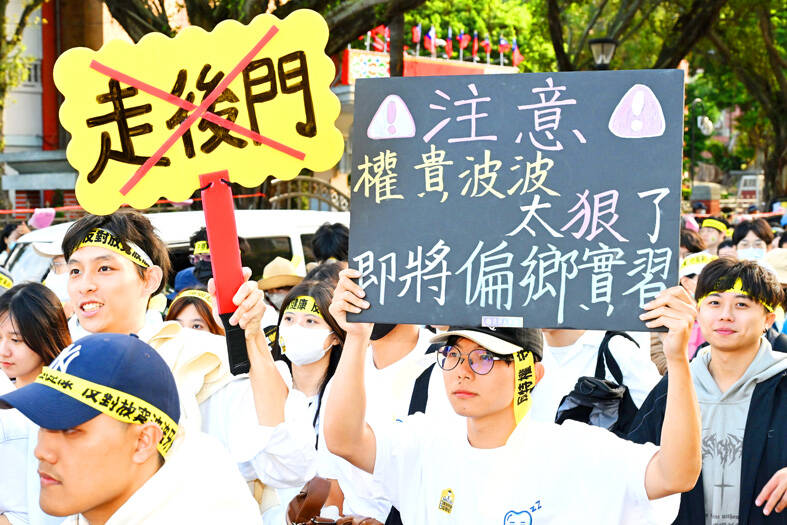A group of dentists yesterday held a march in Taipei, urging the government to amend laws to reduce the maximum number of dentist interns with overseas degrees and not allow non-licensed dentistry graduates who received education overseas to apply for a rural area healthcare program.
The protest was organized by the Taiwan General Dental Practitioners Association (TGDPA) and Taiwan Dentist Alliance (本土小牙醫聯盟), with hundreds of dentists wearing lab coats and other supporters taking part.
TGDPA in a statement said it demands the Ministry of Health and Welfare to reassess its NT$2.4 billion (US$73.64 million) rural area healthcare improvement program and not allow non-licensed overseas dentistry graduates to apply.

Photo: Chen Yi-kuan, Taipei Times
Overseas dentistry graduates’ eligibility to participate in the national examination for dentist licenses should be strictly reviewed, it said.
It also demanded a cap be imposed on the number of dental interns in the nation, with the percentage of interns who studied dentistry overseas not exceeding 10 percent of domestic graduates.
To achieve that, the Physicians Act (醫師法) should be amended, it said.
A total of 391 students enroll in dentistry departments in Taiwan each year, and while an ideal teacher to student ratio for clinical sessions is 1:1 or 1:2, the government sets it at 1:4, allowing 50 overseas graduates to become interns, said Wang Tong-mei (王東美), an associate professor at National Taiwan University’s Department of Dentistry.
The high number of overseas interns and the workload they bring on teachers might affect the quality of training, she said.
Unlike domestic interns, there is no mechanism to test and fail overseas interns, she added.
Phase two of the ministry’s rural area healthcare improvement program would allow foreign educated graduates to apply for it even if they have not done any internship or passed a dental license exam, Taiwan Dentist Alliance chairperson Huang Ying-chi (黃映綺) said.
There could be as many as 100 overseas educated interns in Taiwan each year, she said.
The program says it would provide dental service to 55 rural areas that have no dentists, but in fact they only lack dental clinics, as more than half of them have dental stations and mobile medical services, she said.
Data from the past 15 years show that since Taiwan began recognizing academic credentials from foreign dentistry departments, more than 80 percent of overseas educated interns remained in the country’s six special municipalities, lower than the rate of local dental graduates.
In Taiwan, dentists holding foreign degrees are commonly called “Popo doctors/dentists,” (波波醫生) as most of them studied in Poland after the country joined EU in 2004 and started English-language degree programs in medical sciences.
Over the past few years, Taiwanese have also completed the medical or dental programs in other European countries such as the Czech Republic, Slovakia and Romania.
The International Dental Union Alumni Association said the graduation rate of Taiwan’s dentistry departments is 100 percent, while it is only 50 to 60 percent in many foreign dentistry or medical departments, so going abroad to study dentistry is not “buying credentials.”
The overseas dentistry graduates also need to go through similar examinations and training as domestic graduates and they also need to obtain a dentist license in Taiwan, it said.
The Taiwan Dentist Alliance should stop “smearing and bullying” them, it said.
Additional reporting by Chen Chia-yi

An essay competition jointly organized by a local writing society and a publisher affiliated with the Chinese Communist Party (CCP) might have contravened the Act Governing Relations Between the People of the Taiwan Area and the Mainland Area (臺灣地區與大陸地區人民關係條例), the Mainland Affairs Council (MAC) said on Thursday. “In this case, the partner organization is clearly an agency under the CCP’s Fujian Provincial Committee,” MAC Deputy Minister and spokesperson Liang Wen-chieh (梁文傑) said at a news briefing in Taipei. “It also involves bringing Taiwanese students to China with all-expenses-paid arrangements to attend award ceremonies and camps,” Liang said. Those two “characteristics” are typically sufficient

A magnitude 5.9 earthquake that struck about 33km off the coast of Hualien City was the "main shock" in a series of quakes in the area, with aftershocks expected over the next three days, the Central Weather Administration (CWA) said yesterday. Prior to the magnitude 5.9 quake shaking most of Taiwan at 6:53pm yesterday, six other earthquakes stronger than a magnitude of 4, starting with a magnitude 5.5 quake at 6:09pm, occurred in the area. CWA Seismological Center Director Wu Chien-fu (吳健富) confirmed that the quakes were all part of the same series and that the magnitude 5.5 temblor was

The brilliant blue waters, thick foliage and bucolic atmosphere on this seemingly idyllic archipelago deep in the Pacific Ocean belie the key role it now plays in a titanic geopolitical struggle. Palau is again on the front line as China, and the US and its allies prepare their forces in an intensifying contest for control over the Asia-Pacific region. The democratic nation of just 17,000 people hosts US-controlled airstrips and soon-to-be-completed radar installations that the US military describes as “critical” to monitoring vast swathes of water and airspace. It is also a key piece of the second island chain, a string of

The Central Weather Administration has issued a heat alert for southeastern Taiwan, warning of temperatures as high as 36°C today, while alerting some coastal areas of strong winds later in the day. Kaohsiung’s Neimen District (內門) and Pingtung County’s Neipu Township (內埔) are under an orange heat alert, which warns of temperatures as high as 36°C for three consecutive days, the CWA said, citing southwest winds. The heat would also extend to Tainan’s Nansi (楠西) and Yujing (玉井) districts, as well as Pingtung’s Gaoshu (高樹), Yanpu (鹽埔) and Majia (瑪家) townships, it said, forecasting highs of up to 36°C in those areas